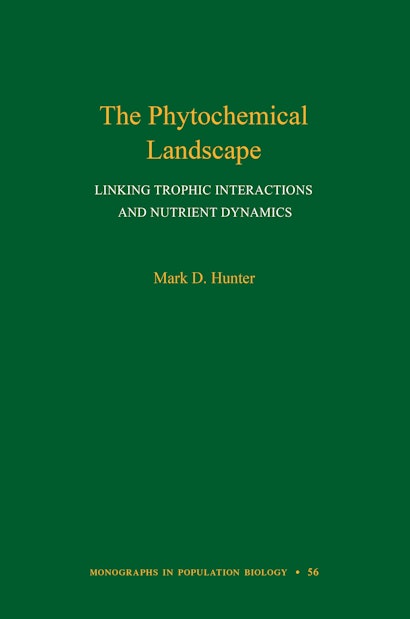The dazzling variation in plant chemistry is a primary mediator of trophic interactions, including herbivory, predation, parasitism, and disease. At the same time, such interactions feed back to influence spatial and temporal variation in the chemistry of plants. In this book, Mark Hunter provides a novel approach to linking the trophic interactions of organisms with the cycling of nutrients in ecosystems.
Hunter introduces the concept of the “phytochemical landscape”—the shifting spatial and temporal mosaic of plant chemistry that serves as the nexus between trophic interactions and nutrient dynamics. He shows how plant chemistry is both a cause and consequence of trophic interactions, and how it also mediates ecosystem processes such as nutrient cycling. Nutrients and organic molecules in plant tissues affect decomposition rates and the fluxes of elements such as carbon, nitrogen, and phosphorus. The availability of these same nutrients influences the chemistry of cells and tissues that plants produce. In combination, these feedback routes generate pathways by which trophic interactions influence nutrient dynamics and vice versa, mediated through plant chemistry. Hunter provides evidence from terrestrial and aquatic systems for each of these pathways, and describes how a focus on the phytochemical landscape enables us to better understand and manage the ecosystems in which we live.
Essential reading for students and researchers alike, this book offers an integrated approach to population-, community-, and ecosystem-level ecological processes.
Mark D. Hunter is the Henry A. Gleason Collegiate Professor of Ecology and Evolutionary Biology at the University of Michigan. His books include Ecology of Insects: Concepts and Applications.
"[Phytochemical Landscape] is written well, carefully documented, and adequately illustrated."—Choice
"The Phytochemical Landscape provides an important roadmap for ecologists and chemists to develop useful theory that can bring together much of the research in chemical ecology."—Lee A. Dyer, New Biological Books
"Plant life on Earth is characterized by an enormous variation in its chemistry. In this unique synthesis, Mark Hunter makes a compelling case that explicit recognition of this variation is central to understanding ecological processes, whether at the population, community, or ecosystem levels. It is a must-read for all ecologists interested in interactions and feedbacks, and is destined to become a classic in the general ecological literature."—David Wardle, Swedish University of Agricultural Sciences
"An organism is basically a bag of interacting chemicals—with an attitude. Gathering, hoarding, and transforming materials from the environment is key for organismal functioning and fitness, and such activities influence ecosystem chemical fluxes and pools. In this masterful book, Hunter synthesizes a heretofore scattered field of research, focusing on how phytochemistry varies across space, and how such variation reflects feedback loops among the physical environment, plants, herbivores, and higher trophic levels. This is essential reading for all ecologists."—Robert D. Holt, University of Florida
"Hunter has produced a remarkably broad, comprehensive, and intellectually exciting treatment of autotroph chemical traits, their complex interactions with other producer traits and consumers, and how these dynamic interactions affect populations, communities, and ecosystems. This is a conceptually rich resource for students and senior investigators alike."—Mark Hay, Georgia Institute of Technology
"This timely and authoritative book offers a potentially transformative way of integrating several disparate ecological subfields to foster the pursuit of big-picture ecological science. It could only have been written by someone with Mark Hunter's vision and breadth and depth of knowledge."—Oswald J. Schmitz, author of Resolving Ecosystem Complexity
"This is an excellent work of scholarship that makes important contributions to our understanding of phytochemistry, herbivory, and their links to ecosystem processes. Hunter's arguments are sound, his organization logical, and his conclusions insightful."—Jennifer Schweitzer, University of Tennessee

